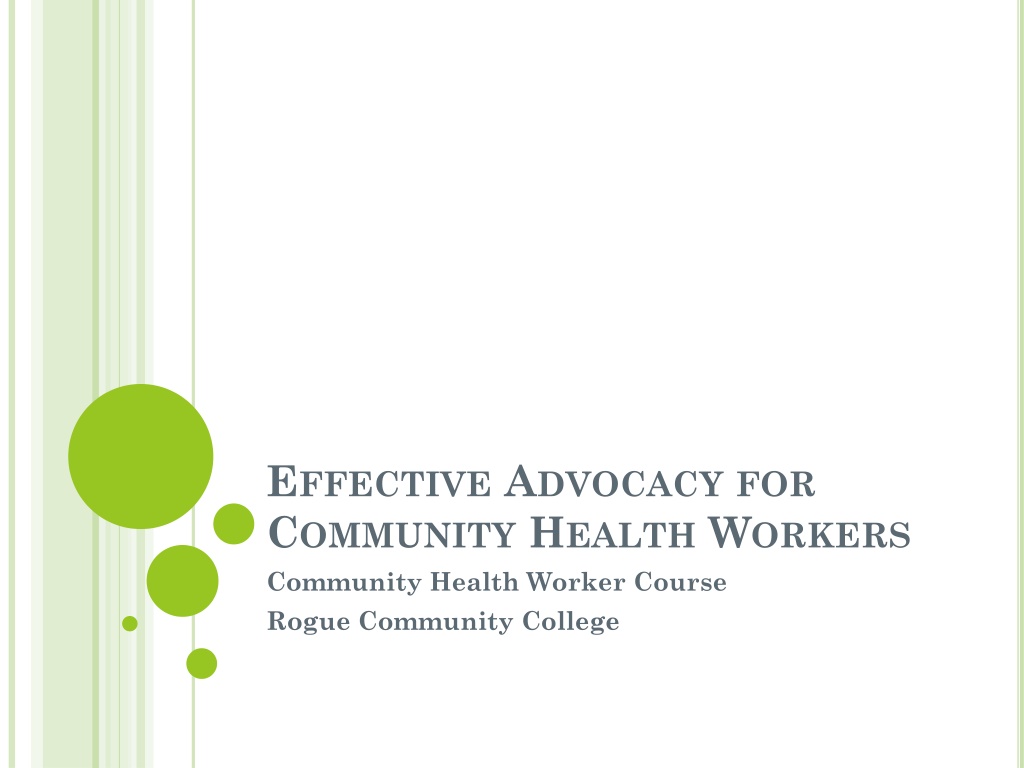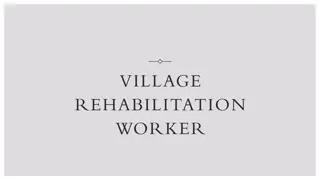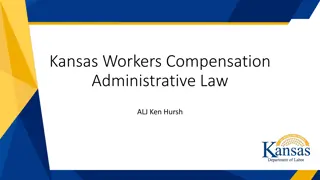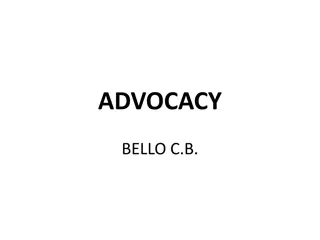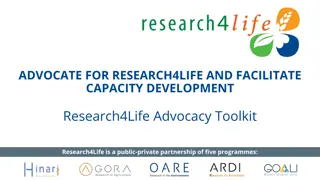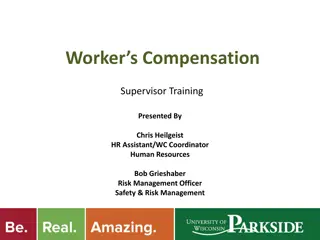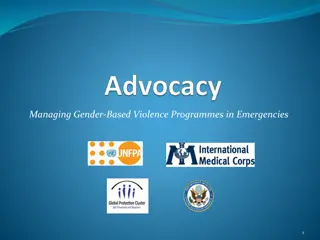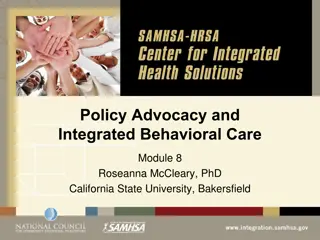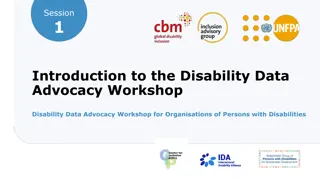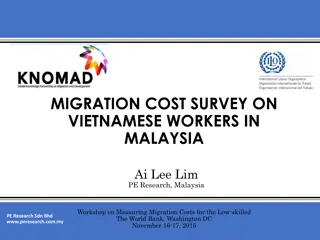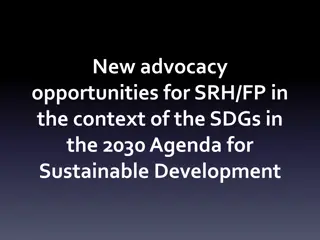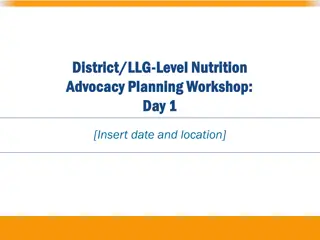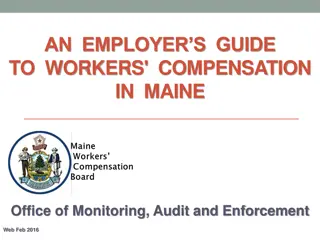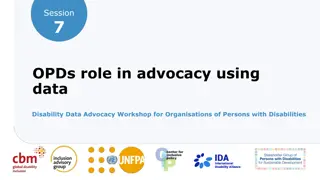Effective Advocacy Strategies for Community Health Workers
Learn about types of advocacy, how to advocate effectively, and the importance of advocacy in community health work. Explore different advocacy settings, understand the meaning of advocacy, and discover key questions and strategies for effective advocacy. Equip yourself with the knowledge to support causes, protect rights, and achieve positive change in your community health work.
Download Presentation

Please find below an Image/Link to download the presentation.
The content on the website is provided AS IS for your information and personal use only. It may not be sold, licensed, or shared on other websites without obtaining consent from the author. Download presentation by click this link. If you encounter any issues during the download, it is possible that the publisher has removed the file from their server.
E N D
Presentation Transcript
EFFECTIVE ADVOCACY FOR COMMUNITY HEALTH WORKERS Community Health Worker Course Rogue Community College
WHAT WE WILL COVER Types of advocacy Advocacy toolbox How to advocate effectively Resources
WHAT DO WE MEAN WHEN WE SAY ADVOCACY?
WHAT IS ADVOCACY? Advocacy noun The act or process of supporting a cause or proposal: the act or process of advocating for something. Source: www.merriman- webster.com/dictionary/advocacy
TYPESOF ADVOCACY Self-Advocacy: Where one represents themselves by speaking about their own rights and interests. Seeking a solution on your own. Systems or Group Advocacy: To influence systems (either social or political) for changes involving groups of people. 1. 3. Individual Advocacy: Speaking for or acting on the behalf of another person to achieve change, protect rights, or achieve justice for someone. Legal or Representative Advocacy: This involves both litigation and legislation for groups or classes of people. 2. 4.
SETTINGSFOR CHW ADVOCACY Within the Treatment Team With various agencies/organizations involved in the client s life (Child Welfare, CCOs, Legal, Social Services, Education, etc.) With governmental bodies (City Council, County Government, the State of Oregon) For individuals or groups of people served. For Community Health Work in general.
9 QUESTIONSTHATWILLAIDEYOUIN ADVOCACY What are you asking for? Who can help you achieve this? What do they need you to tell them? Who is the right person to tell them? What is the best way to get them to hear you? What do you already have in place? What are the specific needs? What is the first step? How will you know if change has occurred?
STRATEGIESFOR EFFECTIVE ADVOCACY Make sure your client is on the same page: Communicate about what you are advocating for. Make sure they are onboard with what you are doing. Help them to advocate for themselves whenever possible. 1. Know your audience. Be prepared with the right kind of information Be prepared to answer questions Be prepared with hard data as well as real stories. 2.
MORE STRATEGIES Know your setting. How much time do you have? Where are you? Ensure confidentiality at all times. 3. Be prepared to answer the following questions: What is the issue? Is there a solution? Who is involved? What contributes to the problem? What contributes to the solution? 4.
MORE STRATEGIES Make sure you are advocating to the correct person/decision making body. 5. Make sure you know the individual s rights. Research laws and regulations whenever possible. Identify policies and procedures. 6. Find and engage with allies. 7. Identify potential opposition and prepare to counteract it. 8.
EVENMORESTRATEGIES Identify existing resources that already exist that either need to be enacted, improved upon, or supported. 9. 10. Remember the 3 Ps of Advocacy Politeness Patience Persistence
WHATNOTTODOWHENADVOCATING Lie Complain Speak just to be heard Send the wrong messenger
HOWCANWEHELPOURCLIENTSFEEL EMPOWEREDTOADVOCATEFORTHEMSELVES? Use person first language. Remember Nothing about us without us! Support them to participate in advocacy whenever you can. Help clients learn advocacy skills.
CHW Advocacy Toolkit: http://peersforprogress.org/wp- content/uploads/2013/12/20131206_wg6_chw_adv ocacy_toolkit.pdf Governor s Advocacy Office: http://www.oregon.gov/DHS/aboutdhs/pages/gao.a spx Disability Rights Oregon: http://www.disabilityrightsoregon.org/ Oregon Health Plan Client Information: http://www.oregon.gov/oha/healthplan/pages/clien ts/main.aspx
This project was funded $3,000,000 (100% of its total cost) from a grant awarded under the Trade Adjustment Assistance Community College and Career Training Grants, as implemented by the U.S. Department of Labor s Employment and Training Administration. Rogue Community College is an equal opportunity employer/program. Auxiliary aids and services, alternate form and language services are available to individuals with disabilities and limited English proficiency free of cost upon request. This work is licensed under a Creative Commons Attribution 4.0 International License.
